Venus in Relationships
sukhī kāntavapuḥ śreṣṭhaḥ sulocano bhṛgoḥ sutaḥ|
kāvyakartā kaphādhikyo’nilātmā vakramūrdhajaḥ||
Bṛhat Parāśara Horā Śastra, Grahaguṇasvarūpādhyāya
The King of the Watery Element
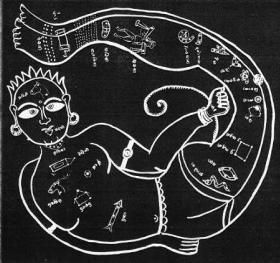 It is common knowledge that Venus, or Śukra, is the significator of love, affection, marriage and romantic relationships of every nature. Not only because it is the seventh lord of the Kālapuruṣa, but because it is the primary ruler of jala tatva or the primordial element of water, governing tithis and pakṣas. One pakṣa consist fifteen tithis which spans 180°, which is one half of a circle, and comes precisely to the seventh house of love and marriage. It is this jala tatva that causes Venus to be the significator of relationships as jala or water rules emotions and affection and tithis lord relationships. Afflictions to Venus are nothing but afflictions to the jala tatva.
It is common knowledge that Venus, or Śukra, is the significator of love, affection, marriage and romantic relationships of every nature. Not only because it is the seventh lord of the Kālapuruṣa, but because it is the primary ruler of jala tatva or the primordial element of water, governing tithis and pakṣas. One pakṣa consist fifteen tithis which spans 180°, which is one half of a circle, and comes precisely to the seventh house of love and marriage. It is this jala tatva that causes Venus to be the significator of relationships as jala or water rules emotions and affection and tithis lord relationships. Afflictions to Venus are nothing but afflictions to the jala tatva.
The most potent form of jala tattva is śukra dhātu. Śukra means that which is pure and bright; liquid such as soma or water which is the essence of life. Hence Śukra in jyotiṣa terminology literally means semen, or that essential fluid which is the building block of life. Venus, therefore, rules the testicles and the ovaries and the reproductive organs, sexuality and libido, the body fluids, sex appeal, and every kind of desire and wish that arises in the hearts of men. It represents beauty, love, devotion, poetry, the arts, sweetness, marriage, flowers, young couples, attraction, infatuation, decoration, adornment, ornamentation, opulence and the luxuries of the earthly plane through the satisfaction of the sensual desires.
Śukra is the healer, the rejuvenator, the one who brings back the dead to life through its mysterious powers of rejuvenation and healing. It is in this capacity, that Venus signifies the Mṛtyuñjaya mantra and the knowledge associated with it known as the Mṛtyuñjaya vidyā. It is also known as the Mṛtasaṅjīvanī vidyā. This special knowledge was granted to Śukrācārya by Śiva as a result of his great penance and tapasyā. Along with the Sun, Venus is the sthira kāraka for the father, for while the Sun brings the individual soul or ātmā to a body, Venus is the śukra or semen which contains the seed from which life springs. It is the embodiment of the juṁ bīja, the very essence of the Mṛtyuñjaya mantra.
The Combustion of Venus
 Venus has a peculiar and symbiotic relationship with Sun. The battle between Venus and Sun is that of self and the world; of the ‘I’ and the Collective. Venus is the carrier of the jivātmā representing the individuality of a person. The Sun is the sarvātmā or the representative of the plurality of ātmās in the created universe. Venus is selfish by nature. He is rājasik and is always taking for himself. He thus governs the private sector which is geared towards making profit for the self. The Sun is of a giving nature. If he takes, then it is only for giving to others, like the government taking tax from the people in order to run the government. In love affairs, when Venus is ahead of the Sun or in higher latitude social circumstances would compel the native to break the marriage or the relationship. Even if Venus should emerge victorious under such circumstance, Jupiter’s aspect on it will defeat Venus. If Venus is behind or lower in latitude than the Sun, the individual self wins over the sarvātmā and the native will win against all odds in matters of the heart despite every opposition form the society.
Venus has a peculiar and symbiotic relationship with Sun. The battle between Venus and Sun is that of self and the world; of the ‘I’ and the Collective. Venus is the carrier of the jivātmā representing the individuality of a person. The Sun is the sarvātmā or the representative of the plurality of ātmās in the created universe. Venus is selfish by nature. He is rājasik and is always taking for himself. He thus governs the private sector which is geared towards making profit for the self. The Sun is of a giving nature. If he takes, then it is only for giving to others, like the government taking tax from the people in order to run the government. In love affairs, when Venus is ahead of the Sun or in higher latitude social circumstances would compel the native to break the marriage or the relationship. Even if Venus should emerge victorious under such circumstance, Jupiter’s aspect on it will defeat Venus. If Venus is behind or lower in latitude than the Sun, the individual self wins over the sarvātmā and the native will win against all odds in matters of the heart despite every opposition form the society.
When Venus is combusted or in close proximity to the Sun, the native shall flee from the persons as indicated by the chara kārakatva of Venus. In the daśā of the Sun, he will emerge victorious. As Venus emerges from the state of combustion, it is slightly ahead of the Sun and can be sighted in the morning prior to sunrise and is known to the world at that time as the Morning Star. Cultures which worship Venus wait for this, as they launch their battle attacks at this time. The further Venus is ahead of the Sun, the more krūra it becomes, as its natural significations become more and more diminished.
Whenever Venus is close to the Sun in a natal chart, it indicates the Sun as the controller of the relationship. The Sun controls through dharma and social norms. The native in such instances gives primacy to dharma and social norms over his personal relationships. If the society does not sanction the relationship, then such a person will conform to the dictates of the society. When Venus is away from the Sun, the native’s decisions will be emotionally motivated, and he will not obey social dictates and instead fight single handedly for his relationship against all odds. This is because the Sun as the sarvātmā represents the collective ātmā or the collective will of the society, while Venus depicts the individual jivātmā or soul.
Taking a clue from this, Venus’ placement second or twelfth from the Sun will influence a native’s romantic relationships to a considerable degree. When Venus is in the twelfth house from the Sun, that is it is behind the Sun, the native will experience multiple relationships. This is because the Sun will ‘give’ Venus or relationships to the native. When Venus is placed second from the Sun, the native will have to ‘give’ to the society and hence ‘give up’ or sacrifice his relationships. The society literally ‘eats’ the native’s relationships as Venus is in the second from the Sun. Both Srila Prabhupada and Swami Vivekananda have Venus placed second from the Sun, showing that they ‘sacrificed’ their personal lives in order to serve a larger cause.
Chart 1: Śrila Prabhupāda
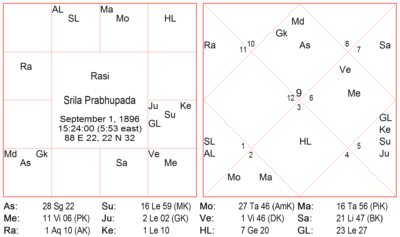
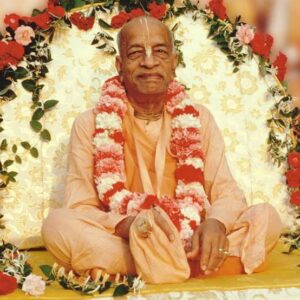
Chart 2: Swāmī Vivekānanda
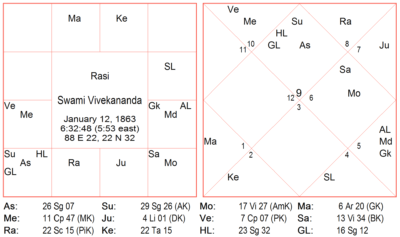
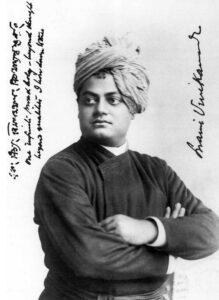
This necessitates a closer examination of conjunctions between Venus and Sun. When Venus and Sun conjoin one must first determine which of the two is stronger, from both lagna and Ārūḍha Lagna. Following this one must note the houses owned by the planets. The further Venus is from the Sun, the crueler the person becomes as he lacks affection and compassion, which he in turn never received from anyone. The closer Venus is to the Sun, (like placed in the second from it), the harder is the struggle within the native to give up sexuality. Mahatma Gandhi struggled throughout his life to give up sexuality and despite being married his experiments to control sexual desire are legendary. He did this by sleeping in a room with naked women and trying to control his sexual urges by not touching them. Even the renunciates, Prabhupada and Vivekananda, would have undergone similar struggles. Prabhupada was married for many years, till he left his wife and family to take sannyāsa and start ISCKON. Similarly, Vivekananda’s parents were keen to get him married as alluring marriage proposals were pouring in. His path, however, was to heed his master’s calling and become one of the greatest sādhus of the world.
Chart 3: Mahatma Gandhi
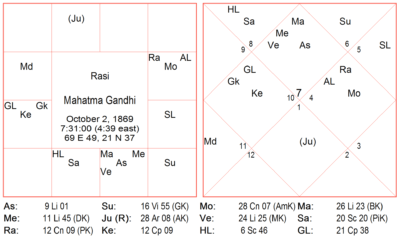
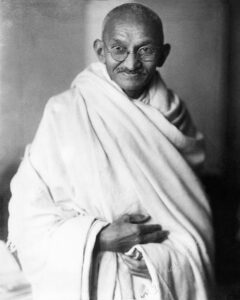
The final determinant of such struggles between the sensual attractions of Venus and the spiritual calling of the Sun is seen from the Ārūḍha Lagna. Ultimately for Vivekananda and Prabhupada Venus is in the sixth from Ārūḍha Lagna, which is not only the maraṇa kāraka sthāna of Śukra, but because benefics in the third and sixth from the Ārūḍha Lagna supports renunciation. For Vivekananda, Venus is badly placed from the lagna in the second house while the Sun is brilliantly placed both from the lagna and the Ārūḍha Lagna. It is in the lagna and in the fifth from the AL. In Prabhupāda’s case Venus is tenth from the lagna, hence there was a marriage, and the Sun is in trines both from the lagna and the AL.
In the case of Gandhi, one can see that Venus is well placed in the fourth from Ārūḍha Lagna, which is not only a kendra placement, but Venus gets digbala in this position. It is in the lagna as the lagnādhipati and Ātmakāraka forming a Mālavya Mahāpuruṣa Yoga. The Sun on the other hand is placed in the third from AL and the twelfth from the lagna in the maraṇa kāraka sthāna. Hence Gandhi was not only married but also a lawyer and a politician and very much embroiled in the complexities of material life. In the case study given below (Chart 4), we have a similar situation where Venus is placed second from the Sun indicating that she had to give up a lot in her relationships as society compelled her to do so. It is however in the seventh from the Ārūḍha Lagna ensuring multiple relationships while the Sun is in the sixth from it. From the lagna both planets are well placed, so the placement from the Ārūḍha Lagna will be the determining factor.
Chart 4: Aspiring Jyotiṣī
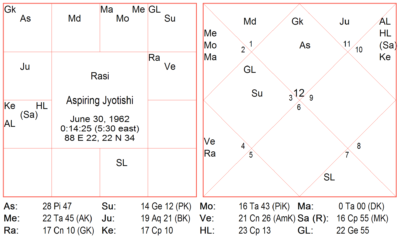
The Seventh from Venus
The seventh house from Venus has to be examined thoroughly to predict the nature of the spouse and from where and who will bring this spouse to the life of the native. Three factors need to be analyzed:
- The seventh lord from Venus
- The planets in the seventh house from Venus
- The nature of the sign in the seventh house from Venus
कुजात् तृतीयतो भ्राता बुधात् षष्ठे च मातुलः।
देवेज्यात् पन्च्मात् पुत्रो दाराः शुक्राच्च सप्तमे॥
kujāt tṛtīyatou bhrātā budhāt ṣaṣṭhei ca mātulaḥ|
devejyāt pancmāt putro dārāḥ śukrācca saptame||
Bṛhat Parāśara Horā Śastra, Kārakādhyāya, Sl. 23
Parāśara tells us that the seventh house from Venus brings the spouse. The lord of the house needs to be examined first. The nature of the planet will indicate the kind of person who will come into the native’s life. One will need to see the planets conjoining and aspecting it as this will modify the characteristics. The placement of this planet from the karaka Venus indicates the intrinsic relationship pattern between the native and the spouse. If this seventh lord from Venus is placed in a dusthāna from it, the relationship may be riddled with difficulties and obstacles. If well placed in trines or kendra there will be a basic harmony in the bonding.
One must examine the tatkālika sambandha between the seventh lord from Venus and Venus, between this planet and the lagna lord and the seventh lord. As was mentioned before, the seventh lord from Venus is the bringer of spouse, and hence its relationship with the significator of love and marriage is crucial. The lagna lord is the self, so the relationship between the two needs to be harmonious. The seventh lord will actually bring about the marriage, so the correlation between the two has to be supportive. If these three associations are promoting the relationship, only then will a particular relationship materialize.
Planets in the Seventh House from Venus
The planets in the seventh house from Venus will show the kind of person who will come into a person’s life. For example, Saturn can show someone who is much older in age, hard working and belonging to a tradition. Ketu can show a spiritual person or maybe an astrologer. Venus can show someone belonging to the entertainment industries or the arts or the management or private sector. The Sun can show a person who has leadership and administrative qualities. In this manner one can examine all the planets. Similarly the sign in the seventh house from Venus should be analyzed. For example, Saturn and Mars’ signs are not good environments for Venus.
The fifth house from Venus needs to be scrutinized in a similar manner. This is important because the fifth house is that of love and affection. The trines are ruled by ākāśa tatva which bind individual ātmās together and ensure there is harmony in a relationship. Without this love and affection relationships cannot be sustained as the seventh house denotes only sexuality.
Planets in the seventh house from the Dārakāraka and the Kārakāṁśa are also indicative about spouses. The seventh from the Kārakāṁśa will show what the ātmā seeks in a spouse, while the seventh from the Dārakāraka will show the qualities which our partners seek in us.
Chart 5: Older Woman
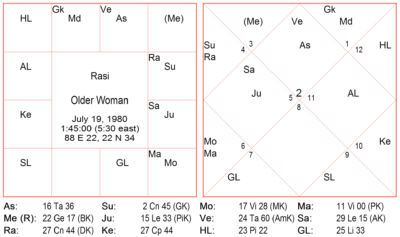

In the example given above (Chart 5), the native has fallen in love with a girl seven years elder to him, where he is 24 and she is 31. His family and friends have tried their best to explain to him not to go ahead in this relationship but such efforts were in vain. He is now set to marry her in December, 2005. Everybody around him has tried to explain to him not to go ahead with this marriage but he does not pay heed to any advice. An astrologer gave him the śrīm bīja and the Viṣṇu Sahasranām as remedies but he is not doing these remedies either.
The seventh lord from Venus, Mars, who is responsible for bringing the spouse, has formed a close conjunction with Mātṛkāraka Moon in the fifth house of love and affection. The Moon indicates a woman who is caring, emotional and replete with motherly qualities. Very often it indicates an older woman. The Upapada in Kumbha confirms this fact. The lord of the UL, Rāhu, who is also the Dārakāraka, is with the ārūḍha of the seventh house. Rāhu therefore is linking the Dāra and Upapadas, showing a woman who is older, probably a widower or someone whose spouse has expired. The seventh lord from the Kārakāṁśa shows that which the ātmā seeks in the partner. In this chart the seventh lord from the Kārakāṁśa is the again the Moon, denoting an older woman. Ever since Rāhu daśā started, the possibility of such a relationship with an older woman became ripe. By the time he was 23 years of age, Venus antara commenced and he met her. This coincides with the onset of Venus Śatābdikā daśā and overlaps with Cancer Nārāyaṇ daśā. From all sides the stage was set for him to meet and fall in love with this girl. Jupiter at that time was transiting the seventh from his UL. The moment it transited to Virgo over his seventh lord and aspected the second from the UL with rāśi dṛṣṭi, his attachment to her was sealed. It would not be surprising if he married her during this transit. There seems little possibility that he will change his mind, and in all probability the marriage will take place. Even if it gets postponed for the time being, he may marry her later, in Venus-Sun Naisargikā daśā. However, once Jupiter transits to Libra, your persuasion may have some effect, as Jupiter will cease to have rāśi dṛṣṭi on the second from the UL. So one should wait till Jupiter transits to Libra and then attempt to talk to him.
As far as remedy is concerned, śrīm bīja will only marry him off quickly as śrīm is Mahālakṣmī svarūpa. The planet representing his iṣṭa devatā is Mars. It is said that the houses which the iṣṭa lords in the rāśi chart, indicates the source of trials and tribulations in one’s life. In this chart, Mars is the lord of the seventh and twelfth houses, showing that his lessons in life will emerge from the areas of marriage and conjugality. Worshipping the iṣṭa devatā in his case is the ideal remedy, for the iṣṭa devatā will take him in the desired direction which will be only for his benefit. The native was advised to chant Om Namo Bhagavate Śrīnṛsiṁhāya 108 times each day. Jupiter is now transiting over his iṣṭa devatā planet and aspecting his Mantrapada by rāśi dṛṣṭi, so there is a strong chance that he might heed the advice and chant the mantra.
Chart 6: Male Caste
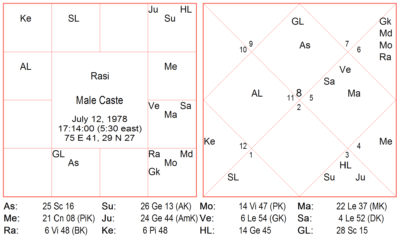
Chart 7: Female Caste
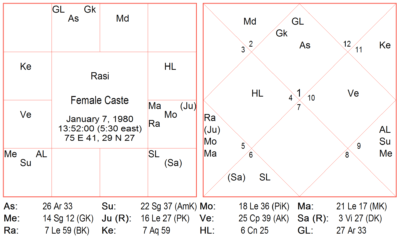
In the above chart, both the seventh house and its lord kalatra kāraka Venus are afflicted by three malefics, indicating difficulties in love and relationships. The Dārapada and the Mṛtyupada are with Venus, Mars and Saturn in the tenth house, indicating that the native probably met his spouse at his place of work or through his work. The combination of A7 and A8 does not bode well for love relationships, as almost from the inception, the relationship will be plagued with obstacles that will threaten its very existence. Since the lagna and the seventh lords are there together, it shows that the couple loves each other very much and desires each other equally. The Upapada is in the eighth house, which too is not a good placement if one desires romantic fulfillment and marriage. Interestingly, both have their Ātmakārakas in the Upapada, indicating a past life connection and a strong desire to manifest that particular ārūḍha pada with which the Ātmakāraka is associated. It is through their self-will and determination that both of them will be able to overcome all obstacles and get married.
The seventh lords from Venus, who bring the spouse, are Saturn and Rāhu. Between the two, Rāhu indicates those belonging to another caste, community or religion. The opposition seems more from the boy’s side than the girl’s, and that too perhaps mainly from his mother. Since sustenance of the relationship is the problem, he will need to worship the Moon, the second lord from the Upapada. In addition there is a Kāla Sarpa Yoga which is also broken by the Moon. The native was advised to do three mālās of the mantra Klīm Gopijanavallabhāya Svāhā every morning and along with it observe a fast every Wednesday from sunrise to sunset drinking only water and fruit juice.
In the case of the spouse, not only is the Ātmakāraka Venus in the UL, but the AK is also the seventh lord indicating that the ātmā will teach her the lessons of life through seventh house matters. Her fifth house is badly afflicted with a Brahma Śāpa and Guru Caṇḍāla Yoga. She has a Kāla Amṛta Yoga broken by Jupiter, but for that Jupiter will have to be released from the grasp of Rāhu. Incidentally, she is also born in a tithi lorded by Jupiter who is the ninth lord in her chart in Rākṣasa ṣaṣṭiāṁśa. For Guru Caṇḍāla Yoga, the Sun needs to be worshipped, whereas for Āditya Caṇḍāla Yoga, guru has to be worshipped. Hence we recommend a Sūrya mantra for her. Her Upapada and the second from Upapada lord is Saturn, whose deity is Nārāyaṇa. So the ideal mantra for her is the Sūryanārāyaṇa mantra. She was advised to chant four mālās of Om Savitre Sūryanārāyaṇāya Namah at Brahma muhūrta each day. She was asked to fast on Saturdays from sunrise to sunset with only water.
Since both have their Ātmakārakas in their Upapada, their self perseverance, determination and positive attitude is crucial to bring about the fruition of the relationship into marriage. Jupiter’s transit in Scorpio (October 2006 to November 2007) is a perfect time for them to get married if they work towards it.
[1] Paper presented in Conference on Vedic Astrology is Novi Sad, Serbia, 2005. Most of the contents of this paper have been learnt in the oral tradition of Sri Jagannath Center from Sanjay Rath.

0 comments